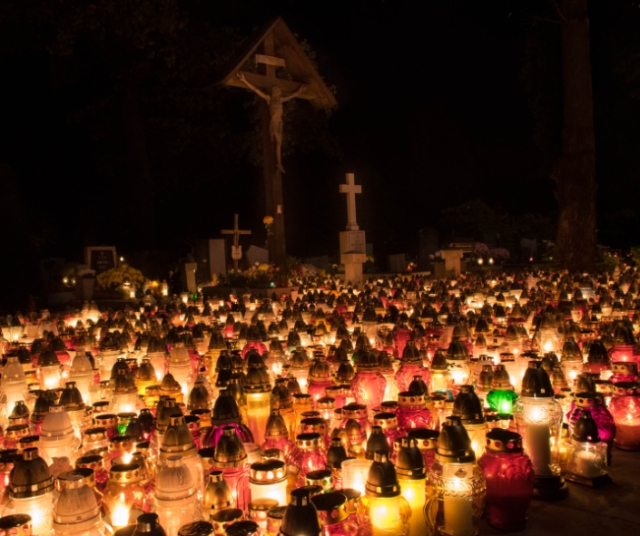All Saints' Day is a celebration rooted in Ecuadorian culture that honors saints and loved ones who have passed away. This holiday, which takes place on November 1 every year, is a special occasion to remember the deceased, pay tribute to them and keep their memory alive. In this article, we will explore why All Saints' Day is celebrated in Ecuador, the traditions associated with this holiday, and the meaning it has for Ecuadorian society.
Origins and meaning of All Saints' Day.
All Saints' Day has its roots in Catholic tradition and dates back to the 9th century, when Pope Gregory IV established November 1 as the day to honor all known and unknown saints and martyrs. The date was chosen to coincide with pagan festivities related to the harvest and the change of seasons, with the aim of Christianizing these celebrations and providing a religious alternative.
In Ecuadorian culture, All Saints' Day is an important holiday that combines elements of Catholic tradition with local practices and beliefs. The celebration is marked by visits to cemeteries, the placing of offerings on graves and participation in religious ceremonies.
Traditions and customs of All Saints' Day in Ecuador.
All Saints' Day is celebrated in Ecuador with a series of traditions and customs that reflect the importance and meaning of the holiday. Some of the most common practices associated with All Saints' Day include:
Visits to cemeteries.
One of the most deeply rooted traditions of All Saints' Day in Ecuador is visiting cemeteries to pay tribute to the deceased. Families go to the graves of their loved ones to clean them, decorate them with flowers and candles, and offer prayers for their souls. This practice is a show of respect and affection towards the deceased, as well as a way to keep their memory alive.
Placing of offerings.
During All Saints' Day, it is common for Ecuadorian families to place offerings on the graves of the deceased. These offerings can include flowers, candles, photographs, food, and personal items that were valued by the deceased while alive. Placing offerings is a way to honor and remember loved ones who have passed away, as well as to keep their presence alive in the memories of the living.
Religious celebration.
All Saints' Day is also an occasion to participate in religious celebrations, such as masses and processions, in honor of saints and the deceased. These ceremonies offer a space for spiritual reflection, prayer, and remembrance of loved ones who have passed away. They also provide comfort and support to those who are grieving, providing a sense of community and solidarity in times of loss.
Preparation of traditional foods.
In some regions of Ecuador, All Saints' Day is celebrated with the preparation of traditional foods that are offered as offerings to the deceased. Among these foods are colada morada, a sweet, thick drink made from purple corn, and guaguas de pan, sweet rolls in the shape of babies that symbolize deceased children. These foods are shared among family and friends as a way to remember the deceased and celebrate life.
Cultural and spiritual meaning of All Saints' Day in Ecuador.
All Saints' Day has a deep cultural and spiritual meaning in Ecuador, which goes beyond a simple religious commemoration. The holiday is an occasion to honor the deceased, celebrate their life and remember their legacy. It is also a time to reflect on one's own mortality and the value of life, as well as to strengthen family and community ties.
From a cultural perspective, All Saints' Day is an expression of Ecuador's ancient beliefs and traditions, which have been passed down from generation to generation over time. The celebration reflects the importance of family, community and collective memory in people's lives, as well as the belief in the continuity of the spirit beyond death.
From a spiritual point of view, All Saints' Day is an opportunity to connect with the transcendent and the sacred, and to find solace and hope in faith. Religious ceremonies and practices of veneration of saints and the deceased offer a space for prayer, meditation and contemplation, as well as for seeking comfort and guidance in times of pain and loss.
Social and emotional impact of All Saints' Day.
All Saints' Day has a significant impact on Ecuadorian society, both socially and emotionally. The festival promotes a sense of community and solidarity among the inhabitants of Ecuador, by offering a space to remember and honor the deceased collectively. It also provides comfort and support to those who are grieving, allowing them to share their pain and find solace in the company of others.
On an emotional level, All Saints' Day is an opportunity to process grief and loss, and to find comfort and healing in the memory of loved ones who have passed away. Celebrating the holiday allows people to express their emotions and feelings of grief in a healthy and constructive way, and provides a space to remember and celebrate the lives of the deceased.
All Saints' Day is an important celebration in Ecuador that honors the saints and the deceased. The holiday is marked by traditions and customs that reflect the importance and meaning of memory and remembrance in Ecuadorian culture. Beyond a simple religious commemoration, All Saints' Day is an expression of the beliefs, values and traditions that have shaped Ecuador's identity and spirituality over the centuries. It is an occasion to honor the deceased, celebrate their lives and remember their legacy, as well as to find solace and hope in faith and community. Ultimately, All Saints' Day is a celebration of love, gratitude and remembrance that unites people and strengthens family and community ties in Ecuador.
